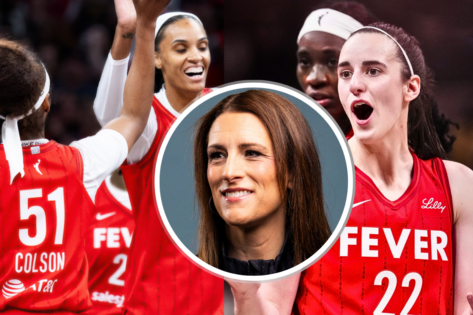

The Indiana Fever's head coach, Stephanie White, has recently voiced her concerns about a troubling trend within the WNBA, spotlighting issues that extend beyond the Indiana Fever's recent heartbreaking loss to the Atlanta Dream. Her comments touch upon coaching challenges, diversity concerns, and the intense pressure now prevalent in the league, especially in the wake of Caitlin Clark's arrival.
White's immediate frustration stemmed from the Fever's narrow 91-90 defeat against the Dream. Despite a strong performance from Caitlin Clark, who tied a WNBA record with her tenth 20-point, 10-assist game in just 42 games, the Fever couldn't secure the win. White pointed to the team's inability to play as a cohesive unit, leading to turnovers and missed opportunities that Atlanta capitalized on. She described the team's performance as "soft" defensively and "sloppy" offensively, emphasizing the need for greater physicality and better execution.
Beyond this single game, White addressed broader issues impacting the league's coaching landscape. She alluded to the frustrations shared by many of the WNBA's 12 head coaches, particularly regarding pacing issues and the difficulties in utilizing out-of-bounds plays effectively. She specifically mentioned the challenges coaches face when having to use replay challenges early in games due to missed calls, disrupting the game's flow. Clark echoed this sentiment, noting that lengthy replay reviews "ruin the flow of the game."
Adding to the sense of unease is the significant turnover in head coaching positions across the WNBA. As the 2025 season approaches, six of the league's teams will have new head coaches, a historic level of change. This includes the Fever, who parted ways with Christie Sides despite Sides leading the team to the postseason amid Clark's skyrocketing popularity. Other teams undergoing coaching changes include the Atlanta Dream, Chicago Sky, Dallas Wings, Los Angeles Sparks, and Washington Mystics.
This wave of coaching changes has also ignited discussions about diversity within the WNBA. Currently, Noelle Quinn of the Seattle Storm is the only Black head coach in a league where the majority of players are Black. The recent firings of two Black head coaches have raised concerns about a potential "diversity black eye" for the WNBA. Commissioner Cathy Engelbert has acknowledged the need to address this imbalance and has emphasized the league's efforts to develop assistant coaches, particularly former WNBA players, as potential head coaching candidates. Names like Briann January (Connecticut) and LaToya Sanders (Washington) have been mentioned as promising candidates.
Furthermore, the intense spotlight on the WNBA, fueled by the arrival of stars like Caitlin Clark, has amplified the pressure on coaches to deliver immediate results. Owners are increasingly eager to see quick turnarounds, leading to shorter tenures for head coaches. The coaches who were recently fired had only been in their positions for one to three years, and all had to grapple with significant player injuries during the season.
The situation is further complicated by controversies surrounding player conduct and fan behavior. Angel Reese of the Chicago Sky was recently suspended following a confrontation with Caitlin Clark, and the WNBA is investigating allegations of hateful comments directed towards players. These incidents add another layer of complexity to the challenges faced by WNBA coaches and administrators as they navigate the league's growing popularity and heightened scrutiny.
In conclusion, Stephanie White's remarks highlight a confluence of issues facing the WNBA. While the league enjoys unprecedented attention, it also grapples with coaching instability, diversity concerns, intense pressure to win, and controversies both on and off the court. Addressing these challenges will be crucial for the long-term health and success of the WNBA.